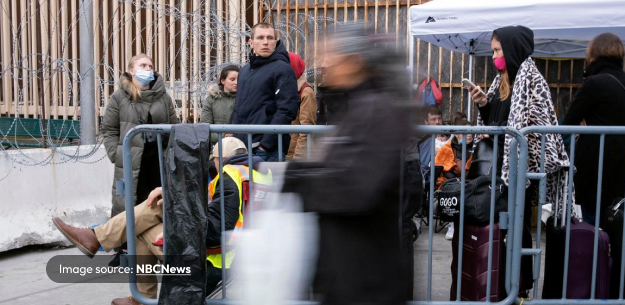The international aid which Ukraine has received as of late has been imperative. The tens of billions of dollars flowing in act to preserve Ukrainian sovereignty and the institutions of democracy not just in Ukraine — but across Caucasia, the Baltics, and the Eastern Balkans. State actors have played their part in this war sufficiently, though certainly not ideally, but wars are not simply the interactions which occur between nations. Individuals and families, both those who have fled from their homes and those who remain in Ukraine, must be given relief. As individuals, we can and should do more, and it would be a mistake to relegate the task of international aid solely to state actors.
As of yet, it is Eastern and Central European nations which have taken on a disproportionate amount of refugees from the war. This is not to say that every nation necessarily must take on a proportional amount of refugees, as it can be logistically and culturally ignorant of the refugees’ wishes, but it does mean that American funds, which primarily flow into Ukraine proper, are not sufficient in aiding the eight million refugees across Europe or the 6.5 million internally displaced people who remain within Ukraine. As of December 16, the US had donated 10 billion dollars in humanitarian aid to Ukraine. The aid provided by other state actors is relatively small. Let’s — extremely generously — say that 20 billion dollars have been donated in humanitarian aid. That’s not even 1,400 dollars per person. Obviously, no state actor has an obligation to bear the burden of the welfare of 14.5 million people, and the amount the international community has sent is not modest — but every person deserves a minimum standard of living. For many refugees and the internally displaced, that is currently not guaranteed. The aid of state actors may be able to ensure Ukraine can win the war. Yet if we as individuals have the ability to aid those who have been displaced — why not do more?
It is not a stretch to say that many here at Andover have distanced themselves from the war in Ukraine, largely seeing it in passing rather than being actively engaged — but let us not forget that it is likely the most important conflict of this moment. Conflicts like those in Syria and Libya may remain conflicts of note, but Ukraine is the focal point of Russian revanchism clashing with Western conceptions of the right to self-determination. It is not every individual’s struggle to try and aid in this war where possible. But here at Andover, the resources many students and their families have are relatively boundless, and if you have the means and the will to do more, the avenues are open.
Organizations like the International Rescue Committee (IRC) work in Ukraine, and anything from volunteering to donation will have real impact. It helps to ensure that displaced Ukrainian citizens receive adequate living conditions, particularly for things like shelter and blankets during what will be one of Europe’s coldest winters in recent years. If you were to go a step further, the United States Department of Homeland Security has set up the Uniting for Ukraine program, through which US citizens can sponsor and provide for a Ukrainian family for two years while they maintain refugee status. I personally know that many Andover students have secondary or even tertiary residences that they do not utilize for the vast majority of the year, and could certainly engage in this program. Of course, inviting a family of strangers into any residence is a monumental step, and it is not my intention to say everyone with the means should do as much. But as a community, our means are substantial. We can affect real change.
One does not need to have a personal connection to this conflict to understand the imperative nature of working towards assisting Ukrainian civilians. This war is an affront to the stability of the existing international system as well as one that spits in the face of human rights, the rules of national sovereignty, and the rules of warfare. Naturally, it would be hypocritical of me to speak so fervently in favor of aid if I were not planning to contribute myself. To this end, I plan to work with organizations similar to the ones listed above to provide humanitarian relief where possible, and, further, I’ve begun to work towards setting up fundraisers to support humanitarian organizations. Tangible impact is within reach.
The Russo-Ukrainian War has led to the largest humanitarian crisis of our time, and if you have the means to do so, your work will have a tangible impact on the lives of those who are affected by this conflict. A person’s voice is all well and good in supporting a cause, but a totalitarian regime will not bend to the whims of an individual, or even millions of them, especially when the voices are foreigners. I urge you to at least consider donating to a humanitarian organization, and if you would be willing to volunteer and work towards assisting Ukrainian civilians, note that the methods are numerous and open. As individuals, it is impossible for us to deal with the root cause of the Russo-Ukrainian War, but we can certainly help to manage its effects.
[This article by William Buehler was originally published by The Phillipian on January 13, 2023.]

